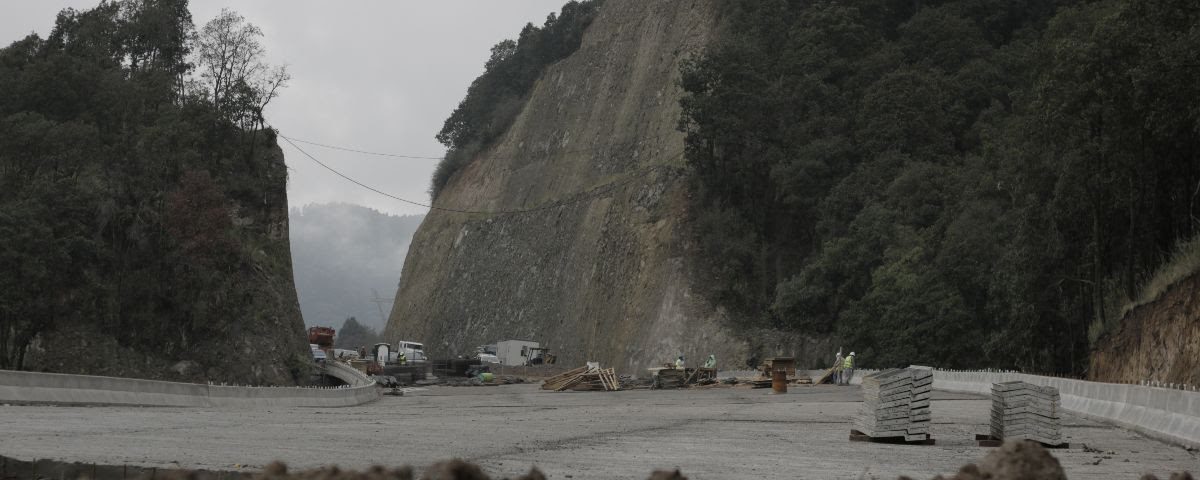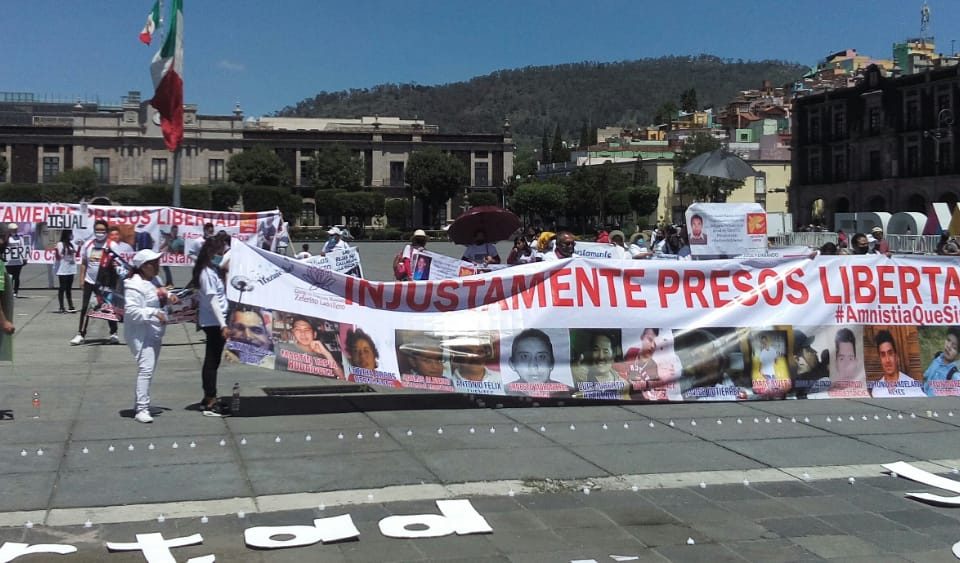
Ecatepec sanitizes 35 thousand public transport units and central supply to prevent the spread of COVID-19
May 2, 2020
State Anticorruption System: complete but dull
May 6, 2020Second Chamber of the Supreme Court attracts appeal for review presented by members of Xochicuautla, for the cancellation of the highway

HIGHLIGHTS
Second Chamber of the Supreme Court attracts appeal for review presented by members of Xochicuautla, for the cancellation of the highway

May 4th, 2020
The Second Chamber of the Supreme Court of Justice of the Nation (2nd Chamber of the SCJN) determined to attract the appeal for review 69/2019 filed by Otomis of San Francisco Xochicuautla to cancel the construction of the Toluca-Naucalpan highway and protect the integrity of its forest.
The 2nd Chamber of the SCJN has the enormous challenge of determining if the Toluca-Naucalpan highway could put at risk the cultural survival and well-being of the Otomí people in San Francisco Xochicuautla and in the Valley of the State of Mexico. If so, it must be canceled the construction, and repair the damage to the territory.
The 2nd Chamber of the SCJN will analyze the case and determine the impact of the highway on the Otomi communities that use the affected territory. For this, the 2nd Chamber of the SCJN must ask itself whether the benefits that the highway intends to bring, according to the “cause of public utility” of the highway project are proportional in relation to the effects on culture, crops, the environment and way of life, in the short, medium and long term that the Otomi people will have to face, distributed in different communities in the region, such as the community of San Francisco Xochicuautla. If it is not proportional, as the complainants denounce, the 2nd Chamber of the SCJN should definitively cancel the highway project.
The constitutional protection trial that gave rise to this attraction was filed in July 2015 (1117/2015, before the Third District Court in Matters of Amparo and Federal Trials of the State of Mexico) when Enrique Peña Nieto decreed the expropriation of part of the territory of the Otomí community for the construction of the Toluca-Naucalpan highway.
In the application for constitutional protection against the decree, the violation of the rights to freedom of worship, cultural integrity, and ceremonial use of the territory was argued. Subsequently, the Airport Highway System, Related and Auxiliary Systems of the State of Mexico (SAASCAEM) presented documentation that sought to prove the carrying out of an indigenous consultation, referred to in the decree, a process that was consequently contested in the trial.
With this information, the community was able to verify that the consultation was carried out 10 years after the project was planned behind closed doors at facilities of the Congress of the State of Mexico; for five consecutive days, indicated in the decree; with indigenous representatives of the community designated by the government of the State of Mexico; with agrarian representatives that the community was unaware of; with technical information that was available at SAASCAEM facilities in Ciudad Satélite; without respecting the assembly institutions of community decision-making; without considering that the Otomí people are scattered in different communities and not only in San Francisco Xochicuautla among other violations of the right to consultation of indigenous peoples. Given the above conditions, the community proved that the consultation violated all international standards regarding indigenous consultations, so its demand was expanded to consider all violations of the process.
The Toluca-Naucalpan highway was planned, tendered, and concessioned between 2006 and 2007 by the government of the State of Mexico when Peña Nieto was governor of the entity. The project concession was awarded to subsidiaries of Grupo Higa, owned by Armando Hinojosa Cantú, businessman benefited by the efforts of the former president.
The route of the highway divides the forest in which the Otomi communities in the area make offerings of great importance for their uses and customs; In addition, in the forest are the sanctuaries to the “Divine Face”. The construction of the highway would cause the head, arms, and heart of the "Divine Face" to be dismembered from the torso and legs; in addition to cutting the water veins that communities use to irrigate their crops and satisfy other needs. According to the Otomi culture, the forest and the hills that comprise it form a human body: the "Divine Face". It is the representation of Christ and shows the cultural symbiosis that characterizes the Otomi community.
2020 marks the 13th anniversary of the start of the territorial conflict. During these 13 years, the municipal, state, and federal institutions of the Mexican State, including the Federal Judicial Branch, have favored the economic interests of one of the business consortiums against the protection of the Otomí people. Currently, the 2nd Chamber of the SCJN has the opportunity to remedy it and protect the Otomi culture and life of the State of Mexico, through the cancellation of the highway giving life to the rights of indigenous peoples.
Contact:
Luis María Barranco Soto CMDPDH Communication Coordinator media@cmdpdh.org Cel. 5544840328 Tel. 5564 2582 ext. 114
Staff
Translator: Martín Caballero
The Second Chamber of the Supreme Court of Justice of the Nation (2nd Chamber of the SCJN) determined to attract the appeal for review 69/2019 filed by Otomis of San Francisco Xochicuautla to cancel the construction of the Toluca-Naucalpan highway and protect the integrity of its forest.
The 2nd Chamber of the SCJN has the enormous challenge of determining if the Toluca-Naucalpan highway could put at risk the cultural survival and well-being of the Otomí people in San Francisco Xochicuautla and in the Valley of the State of Mexico. If so, it must be canceled the construction, and repair the damage to the territory.
The 2nd Chamber of the SCJN will analyze the case and determine the impact of the highway on the Otomi communities that use the affected territory. For this, the 2nd Chamber of the SCJN must ask itself whether the benefits that the highway intends to bring, according to the “cause of public utility” of the highway project are proportional in relation to the effects on culture, crops, the environment and way of life, in the short, medium and long term that the Otomi people will have to face, distributed in different communities in the region, such as the community of San Francisco Xochicuautla. If it is not proportional, as the complainants denounce, the 2nd Chamber of the SCJN should definitively cancel the highway project.
The constitutional protection trial that gave rise to this attraction was filed in July 2015 (1117/2015, before the Third District Court in Matters of Amparo and Federal Trials of the State of Mexico) when Enrique Peña Nieto decreed the expropriation of part of the territory of the Otomí community for the construction of the Toluca-Naucalpan highway.
In the application for constitutional protection against the decree, the violation of the rights to freedom of worship, cultural integrity, and ceremonial use of the territory was argued. Subsequently, the Airport Highway System, Related and Auxiliary Systems of the State of Mexico (SAASCAEM) presented documentation that sought to prove the carrying out of an indigenous consultation, referred to in the decree, a process that was consequently contested in the trial.
With this information, the community was able to verify that the consultation was carried out 10 years after the project was planned behind closed doors at facilities of the Congress of the State of Mexico; for five consecutive days, indicated in the decree; with indigenous representatives of the community designated by the government of the State of Mexico; with agrarian representatives that the community was unaware of; with technical information that was available at SAASCAEM facilities in Ciudad Satélite; without respecting the assembly institutions of community decision-making; without considering that the Otomí people are scattered in different communities and not only in San Francisco Xochicuautla among other violations of the right to consultation of indigenous peoples. Given the above conditions, the community proved that the consultation violated all international standards regarding indigenous consultations, so its demand was expanded to consider all violations of the process.
The Toluca-Naucalpan highway was planned, tendered, and concessioned between 2006 and 2007 by the government of the State of Mexico when Peña Nieto was governor of the entity. The project concession was awarded to subsidiaries of Grupo Higa, owned by Armando Hinojosa Cantú, businessman benefited by the efforts of the former president.
The route of the highway divides the forest in which the Otomi communities in the area make offerings of great importance for their uses and customs; In addition, in the forest are the sanctuaries to the “Divine Face”. The construction of the highway would cause the head, arms, and heart of the "Divine Face" to be dismembered from the torso and legs; in addition to cutting the water veins that communities use to irrigate their crops and satisfy other needs. According to the Otomi culture, the forest and the hills that comprise it form a human body: the "Divine Face". It is the representation of Christ and shows the cultural symbiosis that characterizes the Otomi community.
2020 marks the 13th anniversary of the start of the territorial conflict. During these 13 years, the municipal, state, and federal institutions of the Mexican State, including the Federal Judicial Branch, have favored the economic interests of one of the business consortiums against the protection of the Otomí people. Currently, the 2nd Chamber of the SCJN has the opportunity to remedy it and protect the Otomi culture and life of the State of Mexico, through the cancellation of the highway giving life to the rights of indigenous peoples.
Contact:
Luis María Barranco Soto CMDPDH Communication Coordinator media@cmdpdh.org Cel. 5544840328 Tel. 5564 2582 ext. 114
Staff
Translator: Martín Caballero





